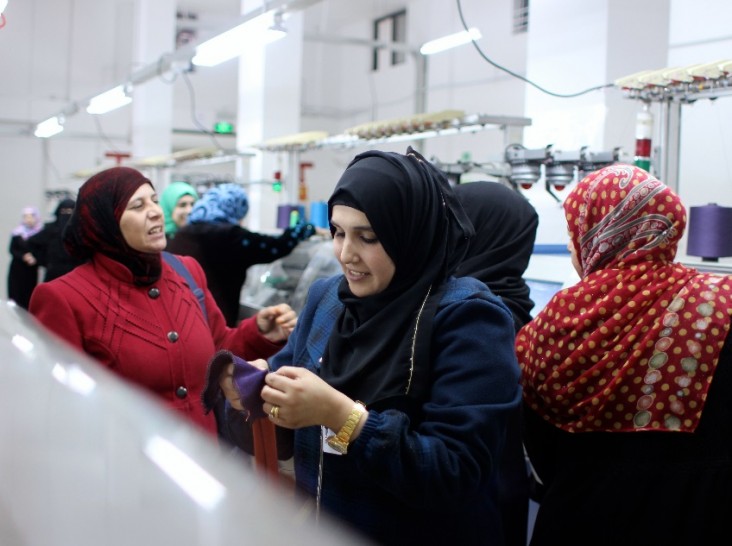Speeches Shim

July 2016—In the city of Al-Ramtha, just miles from the Syrian border, Jordanian women who have never held jobs before must now work to support their families.
The north of Jordan has become home to 49 percent of all Syrian refugees in the kingdom, with only a fourth living in the Za’atari refugee camp. Local communities have experienced significant inflation in the prices of consumer goods and housing. In certain sectors, the influx of Syrian workers has depressed wages for male-headed households.
Women find themselves forced to work to cope with these challenging conditions. These women often lack the skills to confidently and effectively enter the labor market. Adding to their struggles, factory work in the nearby Irbid industrial zone also carries a social stigma that deters women from seeking employment in industry.
USAID’s Jordan Workforce Development Project is working to address these issues by promoting the positive image of vocational jobs and inspiring women and youth to work in industrial occupations.
In Irbid, USAID hosted an event in May entitled “Proud to Be a Craftsman” to encourage local community members in the north to work in industrial occupations. The event was held in cooperation with the al-Hassan Industrial Zone Investors Association, the Irbid Chamber of Industry, and the Employment Directorate in Ramtha.
Among those who attended the event was Areej al-Awaqleh, who was a housewife for 13 years before she began working at the al-Mustamera Factory as a line operator. She is one of 77 women who participated in a week-long training in time management, leadership and problem-solving skills supported by the USAID project. She was promoted to line leader shortly thereafter.
al-Awaqleh describes how the training brought a new confidence to her work in the factory. “Prior to the training, I was often embarrassed in the workplace and did not know how to speak about the problems I faced,” she says. “After the training, I felt empowered to better solve problems at work and to lead others in doing so. Also, I gained a strong work ethic and skills in cultivating a healthy relationship with my boss and peers.
“Before getting this job, I thought only women in Amman had access to good jobs. Although I live in the outskirts of Irbid, I, as well as many other women across Jordan, can benefit from these initiatives to improve our livelihoods.”
Now an ambassador of change within her community, al-Awaqleh tries to introduce her friends and sisters to the empowerment she found with successful employment.
“Now I can’t imagine life without my job. It has given value to my time,” she says. “At work, the team functions cohesively, much like a family. Women practice with their children and husbands what they learned in the training, and even use their newfound skills to solve conflicts at home.”
The Jordan Workforce Development Project, which runs from 2014-2019, is designed to increase private sector employment, especially for women, youth and those living at or below the poverty line. To date, the project has successfully placed more than 300 Jordanians in new jobs in the food production, clean energy and garment sector and launched eight public-private partnerships to create job placement and improve employee retention.
LINKS
Follow @USAIDJordan, on Facebook, on Flickr, on YouTube

Comment
Make a general inquiry or suggest an improvement.